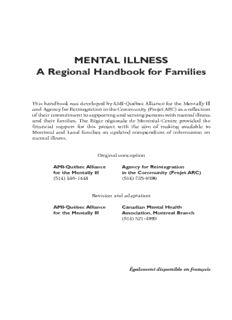
ami handbook.e PDF
Preview ami handbook.e
MENTAL ILLNESS A Regional Handbook for Families This handbook was developed by AMI-Québec Alliance for the Mentally Ill and Agency for Reintegration in the Community (Projet ARC) as a reflection of their commitment to supporting and serving persons with mental illness and their families. The Régie régionale de Montréal-Centre provided the financial support for this project with the aim of making available to Montreal and Laval families an updated compendium of information on mental illness. Original conception AMI-Québec Alliance Agency for Reintegration for the Mentally Ill in the Community (Projet ARC) (514) 486-1448 (514) 735-9399 Revision and adaptation AMI-Québec Alliance Canadian Mental Health for the Mentally Ill Association,Montreal Branch (514) 521-4993 Également disponible en français This handbook is available free of charge to people with mental ill- ness and their families in Montreal and Laval. See the back cover for the family association nearest you. Copies are available for pur- chase by the general population at CMHA, Montreal Branch 847 Cherrier Street, Suite 201 Montreal, Quebec H2L 1H6 Tel. (514)521-4993 Fax (514)521-3270 The masculine gender is used without discrimination in the handbook. The expression “affected person” used without any other qualifier in the text designates people suffering from mental illness. Copyright 1992 AMI-Québec Alliance for the Mentally Ill Inc. and Agency for Reintegration in the Community (Project ARC Inc.) 2nd edition 1993 3rd edition 1997 4th edition 2003 Legal deposit: Bibliotheque nationale du Québec, 2003 National Library of Canada, 2003 ISBN 2-921948 18 4 ii Acknowledgements This revised edition has been made possible thanks to the finan- cial support of the Régie régionale de la santé et des services soci- aux de Montréal-Centre, Services de santé mentale. Special thanks to the individuals who contributed their time and expertise to this edition: Darlene Johnstone made corrections to the text; Bryna Feingold edited the text; Andy Brown designed the layout; Communication le dernier mot (Sylvie Dupuis) translated. Thank you to Dr. Allan Fielding who revised the chapter on mental illness and to Services de santé mentale at the Régie for making the updated information available. A special thank you to Ayala Conway for her help in the myriad tasks related to this edition. Ella Amir Jacques Duval Executive Director Executive Director AMI-Québec CMHA Alliance for the Mentally Ill Montreal Branch iii To the Reader The production of this handbook is the result of a close collabora- tion of healthcare professionals and families of persons with men- tal illness. These families have learned to accept, with devastating sadness, that someone they love is a victim of schizophrenia, bipo- lar disorder or another serious mental illness. Individuals who develop mental illnesses are disabled to varying degrees. Some need assistance from professional mental health workers for a relatively short period of time, while others will con- tinue to need formal and informal support throughout their lives. The handbook deals with the subject as it relates to both the hos- pital and the community, addressing the different aspects of con- cern to the affected person and his family. Please note, however, that this guide is not intended to replace professional advice. The information it contains is more suitable to adults than to children affected by mental illness. In order to provide ongoing support and to also have a life of your own, you deserve to know as much as possible about mental ill- ness: how to manage it and cope with it on a daily basis; what resources are available in the community; and the implications of the law regarding the rights of those with mental illness. Spouses, parents, brothers, sisters, children, anyone affected by mental illness, this handbook is for you. It is our hope that the material inside will alleviate anxiety and pain in some small way. And remember... You are not alone! Keep this handbook somewhere you can refer to it easily.You may find different parts useful at different times. v Some of the information in this handbook is sub- ject to change. Please update your information regularly and record any changes below. vi Table of Contents Acknowledgements............................................................................iii To the Reader.......................................................................................v Table of Contents..............................................................................vii 1.Mental Health Services in Hospitals and CLSCs.......................................................1 QUEBEC LAW.....................................................................................1 SECTORIZATION.................................................................................2 PSYCHIATRYAND JUSTICE..................................................................2 THE HOSPITAL MILIEU.......................................................................3 Hospital Services......................................................................3 Hospital Treatment Teams........................................................6 Hospital Admissions.................................................................7 Voluntary...............................................................................7 Involuntary............................................................................7 RIGHTSAND RECOURSES..................................................................9 PSYCHIATRIC HOSPITALSAND DEPARTMENTS................................12 CLSCS LOCAL COMMUNITY SERVICE CENTRES..........................15 2.The Role of the Family.................................................17 CAREGIVING....................................................................................17 The Family as Caregivers......................................................17 Knowing the System..............................................................19 T TABLE OF CONTENTS After Hospitalization..............................................................20 Taking Care of Yourself..........................................................21 RESOURCES......................................................................................22 Family Associations................................................................22 Problems,Complaints and Grievances.................................25 If a Family Member Refuses Treatment................................26 Legal Services / Legal Aid......................................................26 Trust Funds and Wills............................................................27 The Public Curator................................................................28 3.Returning to the Community................................31 COMMUNITY MENTAL HEALTH RESOURCES..................................31 CRISIS CENTRES...............................................................................31 HOUSING RESOURCES....................................................................32 EDUCATIONAL,RECREATIONAL,CULTURALANDTHERAPEUTIC ACTIVITIES;SELF-HELP GROUPSAND INFORMATION....................34 COUNSELLINGANDTHERAPY.........................................................38 ADVOCACY,FOLLOWUPANDASSISTANCE....................................39 HELPLINESAND FACE-TO-FACE HELP.............................................40 LEGALAND CRIMINAL MATTERS....................................................42 INCOME SECURITY (WELFARE)......................................................42 TRAININGAND ENTERINGTHEWORKFORCE..............................44 ADDITIONAL RESOURCES .............................................................45 viii T TABLE OF CONTENTS 4.Mental Illness.......................................................................47 SYMPTOMS OF MENTAL ILLNESS.....................................................47 TYPES OF MENTAL ILLNESS.............................................................48 Schizophrenia.........................................................................48 Schizoaffective Disorder........................................................49 Affective Disorders (Bipolar Disorder,Depression)..........50 Obsessive Compulsive Disorder..........................................51 Anxiety Disorders.................................................................52 Personality Disorders............................................................53 Eating Disorders....................................................................54 Substance Abuse....................................................................55 Post Traumatic Stress Disorder............................................55 SUICIDE............................................................................................56 MEDICATIONS..................................................................................57 Antipsychotics........................................................................59 Antidepressants......................................................................61 Mood Stabilizers....................................................................64 Anxiolytics..............................................................................65 DRUG INSURANCE..........................................................................66 Suggested Reading......................................................................69 ix
Description: